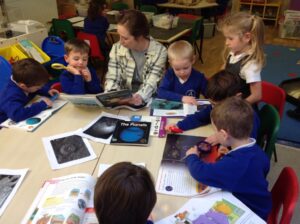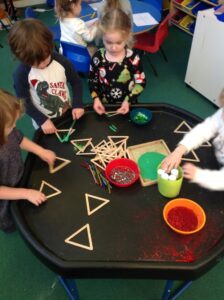St Andrew’s EYFS Vision Statement
Our vision in Early Years at St Andrew’s is to meet the needs of each individual child. We work hard to ensure we promote and celebrate independence, difference and inclusivity. We believe there are no glass ceilings for our children and work as a strong team to provide a nurturing teaching and learning environment, in order to help children be the best that they can be. We work closely with parents and carers to ensure we get to know the whole child and form close working relationships in order to provide support.
In our Early Years we strive and encourage our children to live ‘Life In All Its Fullness’ and to be:
Valued
Heard
Curious
Creative
Independent
Problem solvers
Good citizens
Accepting
Equal
Inquisitive
And believe that anything is possible.
Welcome to the Early Years
At St Andrew’s we are proud of our Early Years Foundation Stage (EYFS) provision. We currently run a 26 place teacher led Nursery class and a 30 place teacher led Reception class. Additional support staff include a qualified Nursery Nurse and teaching assistants.
We believe in supporting and nurturing every child’s learning and development in order that they make rapid and sustained progress. Our exciting and challenging play-based curriculum is linked to the children’s interests. Activities are planned carefully to inspire and deepen understanding. Learning takes place in our spacious and stimulating setting both indoors and outdoors, in all weathers. It can take place in small or larger groups, sometimes guided by the teacher and is often independent or ‘Child Initiated’ (CIL).
Early Years Framework
In the Early Years our Curriculum has been created based upon the Early Years Framework 2021. Our curriculum is split into seven areas of learning:
Prime Areas:
- Communication and Language
- Personal, Social and Emotional Development
- Physical Development
Specific Areas:
- Literacy
- Mathematics
- Understanding the World
- Expressive Arts and Design
Characteristics of Effective learning
These describe the different ways children learn rather than what they learn.
The three Characteristics of Effective Learning comprise:
- playing and exploring,
- active learning and
- creating and thinking critically.
They begin at birth and are lifelong characteristics which are critical for building children’s capacity for future learning. These characteristics need to be understood by practitioners working across all seven areas of Learning.
It is important that the Characteristics of Learning underpin the prime and specific curriculum areas and are specifically planned for. Skills such as independence, curiosity, resilience, collaboration, and reflection are critical for success as a 21st century learner.

